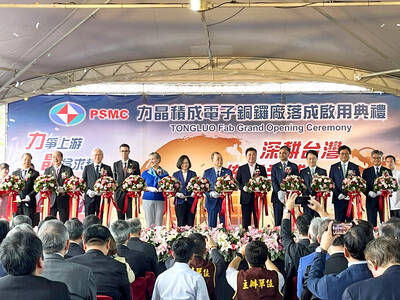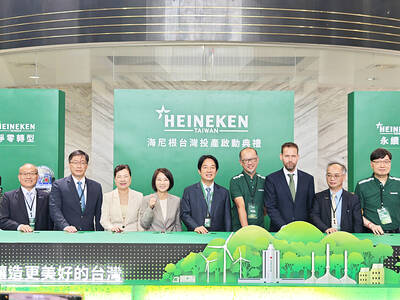Shares of China Airlines (中華航空) and EVA Airways (長榮航空) rallied in yesterday morning‘s trade on increased optimism toward their earnings outlook after direct flights between Taipei International Airport (Songshan) and Tokyo International Airport (Haneda) resumed a day earlier following a 31-year hiatus, dealers said.
China Airlines rose 4.61 percent to NT$24.95, while EVA Air gained 6.47 percent to NT$32.90.
China Airlines and EVA Air will provide 14 Taipei-Tokyo return flights each week.
According to Hua Nan Securities (華南永昌投顧), the resumption of direct flights between the two airports is expected to boost the number of Japanese tourists visiting Taiwan by about 10 percent a year.
BENEFICIARIES
“Without doubt, China Airlines and EVA Air are the two direct beneficiaries of the flight resumption,” Hua Nan analyst Henry Miao (苗台生) said.
“The strong buying seen this morning reflects investors’ upbeat mood about the two carriers,” Miao said.
Hua Nan Securities said the new route’s contribution to the two carriers’ sales would become clearer next year, as the contribution to this year’s revenues would be minimal because there are only two months remaining.
Taking the Taipei-Tokyo flights into account, Hua Nan Securities said China Airlines was expected to post earnings per share of NT$2.79 this year and NT$3.07 next year. This compares with a loss per share of NT$0.83 last year, when the global economic meltdown hit the airline business.
Hua Nan Securities forecast EVA would register earnings per share of NT$4.84 for this year and NT$5.08 next year, compared with a loss of NT$0.96 last year.
CONVENIENCE
China Airlines said on Sunday the Taipei-Tokyo flights were expected to have an average capacity of 80 percent because of the increased convenience it offers travelers.
Landing at Haneda rather than at Narita International Airport — the usual destination for international flights, which is farther from Tokyo — can save travelers at least 30 minutes on the commute into Japan’s capital.
Hua Nan Securities had a target price of NT$28 for China Airlines and NT$38 for EVA Air.

purpose: Tesla’s CEO sought to meet senior Chinese officials to discuss the rollout of its ‘full self-driving’ software in China and approval to transfer data they had collected Tesla Inc CEO Elon Musk arrived in Beijing yesterday on an unannounced visit, where he is expected to meet senior officials to discuss the rollout of "full self-driving" (FSD) software and permission to transfer data overseas, according to a person with knowledge of the matter. Chinese state media reported that he met Premier Li Qiang (李強) in Beijing, during which Li told Musk that Tesla's development in China could be regarded as a successful example of US-China economic and trade cooperation. Musk confirmed his meeting with the premier yesterday with a post on social media platform X. "Honored to meet with Premier Li

ARTIFICIAL INTELLIGENCE: The chipmaker last month raised its capital spending by 28 percent for this year to NT$32 billion from a previous estimate of NT$25 billion Contract chipmaker Powerchip Semiconductor Manufacturing Corp (力積電子) yesterday launched a new 12-inch fab, tapping into advanced chip-on-wafer-on-substrate (CoWoS) packaging technology to support rising demand for artificial intelligence (AI) devices. Powerchip is to offer interposers, one of three parts in CoWoS packaging technology, with shipments scheduled for the second half of this year, Powerchip chairman Frank Huang (黃崇仁) told reporters on the sidelines of a fab inauguration ceremony in the Tongluo Science Park (銅鑼科學園區) in Miaoli County yesterday. “We are working with customers to supply CoWoS-related business, utilizing part of this new fab’s capacity,” Huang said, adding that Powerchip intended to bridge

Dutch brewing company Heineken NV on Friday announced an investment of NT$13.5 billion (US$414.62 million) over the next five years in Taiwan. The first multinational brewing company to operate in Taiwan, Heineken made the statement at a ceremony held at its brewery in Pingtung County. It also outlined its efforts to make the brewery “net zero” by 2030. Heineken has been in the Taiwanese market for 20 years, Heineken Taiwan managing director Jeff Wu (吳建甫) said. With strong support from local consumers, the Dutch brewery decided to transition from sales to manufacturing in the country, Wu said. Heineken assumed majority ownership and management rights

Microsoft Corp yesterday said that it would create Thailand’s first data center region to boost cloud and artificial intelligence (AI) infrastructure, promising AI training to more than 100,000 people to develop tech. Bangkok is a key economic player in Southeast Asia, but it has lagged behind Indonesia and Singapore when it comes to the tech industry. Thailand has an “incredible opportunity to build a digital-first, AI-powered future,” Microsoft chairman and chief executive officer Satya Nadella said at an event in Bangkok. Data center regions are physical locations that store computing infrastructure, allowing secure and reliable access to cloud platforms. The global embrace of AI